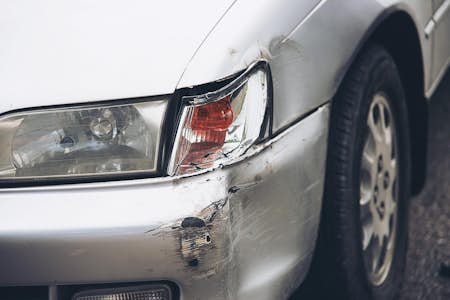Finding car insurance can an absolute minefield, with thousands of choices being offered from hundreds of providers in the UK.
Of course, there is no way around shopping for car insurance and each year, millions of British drivers get online or on the phone to renew their policy or hunt down a new deal.
Whilst it was once commonplace to stick with the same provider every year, often going via a broker, drivers today are far more likely to switch between providers.
In fact, in 2020, Go Compare found that car insurance is the ‘most switched financial product of the decade’ with over half (56%) of UK adults switching providers since 2010.
Why? Because competition is hot and prices are forever changing.
Brand loyalty has waned when it comes to financial products, and consumers rightly want to hunt down the best value.
But, the path to finding cheap financial products - including car insurance - never did run smooth.
To help you understand and find car insurance deals, here is our guide on how to get the best options for you.
Average car insurance cost in the UK
We firstly need a gauge - or measuring stick. We need to know and understand what the average car insurance cost in the UK is.
This varies year by year, and given the hugely diverse number of factors involved in any one car insurance calculation, it’s tough to nail down an exact figure.
In 2020, Statista and Money Supermarket suggested the average UK car insurance premium was between £400 and £450.
Confused.com and Which? instead state the average is more like £500 to £650.
One thing that is for sure is that car insurance prices are decreasing as of late.
In 2021, car insurance prices have hit a historical low point, with younger drivers between 17 and 19 enjoying the most significant drop in insurance costs - some 37% lower compared to 2020.
For those aged above 50 but below 64, the average car insurance cost in the UK is currently £339. The average premiums for the over 65s are around £258.
It's worth taking these figures with a grain of salt as every source seems to indicate a different average.
It’s best to work with age-based averages as the data here is much clearer.
For most single drivers 50 or older who drive a standard hatchback with an average yearly mileage of around 10,000, and other factors, it’d be rare to find insurance costing more than £500.
Why are insurance prices falling?
Insurance prices are tied to risk on the roads. Lockdown and coronavirus have vastly impacted our average mileage. Brits drove 550 million miles fewer in 2020 than before lockdown began!
This means lower car insurance prices, for now!
How to find the best car insurance deals
Are you looking for the best car insurance deals? Of course you are!
Firstly, you’ll need to look into the various factors that influence the price of car insurance.
Car insurance prices are almost entirely risk-based. The higher risk your unique set of factors are, the more expensive your insurance will be.
Your vehicle
The first and most obvious risk to many is the car’s value and what sort of car it is.
Consider the risk of insuring an Aston Martin DB9 kept on the road in an inner-city area compared to a small electric VW E-Up stored in a secure garage - the difference will be astronomical.
Your age and profession
Your circumstances form the backbone of your car insurance quote.
Age, as we know, is probably the most significant factor affecting car insurance prices.
Insurers use thousands of statistics related to age and professional occupation to gauge risk. They have to balance this with other factors to avoid prejudice or discrimination, but you can be sure that any occupation involving driving will increase your premium.
No claims and driving history
Your no claims discount will influence your quotes, as will your insurance history, including the quantity and details of any past claims.
Insurers will take your licence details into account - driving offences will increase the costs of premiums.
The longer you’ve been driving without incident whilst racking up no claims discounts, the better.
Your annual mileage
The less you drive, the less risk you pose for yourself and others on the road.
Those with the lowest annual mileage will get the cheapest quotes. Underestimating your mileage can result in your policy being declared invalid. It’s a dangerous game to play, so make sure you have a realistic figure in mind.
Different insurers will have varying tolerance when it comes to underestimated mileage.
The RAC states here that discrepancies of 10,000 miles or so are likely to cause issues. Ask your insurer if you’re unsure how much driving you’ll be doing during your coverage period.
Address and location
Your location and address will significantly influence your car insurance costs.
Insurers use statistics on how many crashes, incidents, fires, and thefts occur in your local area. Of course, they understand that you’re not always driving in your local area, and some of these factors will be negated if you keep your car on a driveway or in a garage.
Using car insurance comparison websites
If you’re ready to start searching for car insurance, you’ll likely be using a cost comparison website.
There are four main options here:
- Compare The Market
- Confused.com
- Money Supermarket
- Go Compare
Each comparison site works broadly the same way. Most have different tools for searching for telematics or black box insurance or niche or premium car insurance.
To get a quote, you’ll simply need to enter all of your details. The tool will compile the best quotations, and voila! You’ll have an instant shortlist of car insurance policies ready to compare.
Different comparison sites will display quotes from the same insurers at different prices, so it’s best practice to check more than one.
It’s also best to ring up insurers and haggle a better deal. Insurers likely pay a commission to the comparison site, so they’re often prepared to offer you some money off if you go direct.
Bear in mind that some insurers, like Direct Line, do not operate on comparison sites.
For some car insurance, e.g. premium car insurance, large family policies or when more customisation is needed, it might be best to use an insurance broker.
Reducing your car insurance risk
If you want to find the very best deals, you’ll need to lower your risk before searching for the best car insurance companies in the UK.
You have power over more factors than you might think - this is your chance to score some points against the insurers!
Taking a few steps to reduce your insurance risk before taking out a new policy can vastly reduce costs both now and in the future.
Here’s what to do:
1. Secure Your Car
Securing your car is the first step towards getting a better deal on your car insurance.
Keep it in a garage if you can. The driveway is the next best thing. Anywhere too far from your house is the worst.
Fit an approved Thatcham alarm or mobiliser if you can. Some cars will already be equipped with one - check if you’re unsure.
2. Choose a Low Insurance Car
Low insurance cars are typically newer, lower emissions models. New or popular cars have more available parts and are easier and cheaper to repair.
There are some 50 car insurance groups that your car can fall into - you can check your car’s insurance group using tools like this.
Small, popular, safe, lightweight and low-emission cars are the most likely to fit into group 1 - the cheapest group. Some examples include the VW Up! 1.0l or Skoda Citigo 1.0l.
3. Consider Black Box or Telematics Insurance Provider
If you know you’re a super-safe driver, then telematics might be for you. This can decrease your premiums if you drive a fast car but drive it safely, for example.
This involves the insurer fitting a small unit to your car that measures you when driving. Your insurer will take speed, mileage and other safety metrics such as braking and cornering into account and adjust your premiums on the go.
Telematics insurance is polarising, and the gains are questionable, particularly for experienced drivers. But, with broader availability and cheaper pricing than ever, telematics or black box insurance is worth considering for some.
4. Add Another Driver
You shouldn’t try and ‘game’ your car insurance quotes by adding other drivers to the policy.
That said, joint policies with lower risk drivers will reduce the overall premium.
5. Adjust your Voluntary Excess
Voluntary excess is the amount you’ll have to contribute to your claim when you make one.
For example, if you make a claim for £1,000 with an agreed voluntary excess amount of £250, then the car insurance provider will keep the first £250 and pay out the remaining £750. If you choose a voluntary excess of £500, they’ll only pay out the remaining £500.
Choosing a higher voluntary excess is suitable for those who believe they’re less likely to make a claim. They provide you with a means to ‘bet’ on your own risk - the higher your voluntary excess, the higher your bet.
Remember that choosing higher voluntary excess results in lower premiums whilst increasing the amount you do have to pay if you make a claim.
6. Consider Add-Ons
There are many different car insurance add-ons that you’ll likely have the option to select/deselect from your coverage.
Some add-ons to watch out for include breakdown cover, which may or may not be cheaper to purchase elsewhere, no claims discount protection, legal cover, enhanced accident protection and key cover/key care.
Courtesy cars are perhaps the main add-on that people require from their car insurance and are generally included in all comprehensive insurance as standard - but always check.
Can I drive another car on my insurance?
If you’re wondering, “can I drive another car on my insurance,” you’ll need to check if your policy has the DOC clause.
‘Driving other cars’ is called DOC on your policy - literally standing for driving other cars.
To drive other cars on your insurance legally, you’ll need a DOC clause on your policy.
Whether or not your policy comes with DOC is something you’ll need to check.
The usual conditions are:
- You’re 25 or over when your policy starts
- You have a fully comprehensive policy
- The car you’re driving is insured
- Your own car isn’t written off and must be driveable
- You don’t work in a trade where you often drive other vehicles (e.g. you’re a car dealer)
In short, if you’re not sure if you have a DOC policy, then don’t drive another car.
It’s not as simple in the UK as in other countries, such as France, where DOC is standard.
Always check for DOC before you drive another car!
Can I cancel my car insurance?
Your driving circumstances can change. You might lose your car for financial reasons, be unable to drive for physical, mental or other personal reasons, or otherwise need to stop driving.
In these situations, you might be wondering, “can I cancel my car insurance?”
The short answer is yes. Insurers will let you cancel your policy and will usually refund some money against the remaining policy duration. There will be a cancellation/admin fee involved.
If you feel you’re at higher risk of cancellation, you can negotiate with your insurer, and they might provide you with a cheap way to cancel.
It’s worth bearing in mind that all insurance must be sold with a minimum 14-day cooling-off period in which you can cancel for free for a full refund. Some insurers may offer an extended cooling off period.
Everything you need to know about car insurance
Car insurance is simply one of life’s necessities.
If you want to learn more about other types of insurance such as home renters insurance or unusual types of niche insurance, then you can on Pension Times.
But when it comes to car insurance, nailing down the best deals can be a tough one.
The best approach to crunching the numbers and finding the best deals is a meticulous approach - patience and attention to detail can pay dividends - and you might avoid some very nasty surprises!
Always try multiple sites, get quotes directly and haggle on the phone.
If you’re looking to drive other cars on your insurance, ask about DOC.
Sceptical about add-ons and whether or not you need them? Ask before you purchase.
By seeking out important information and understanding your own insurance risk, you’re well on your way to securing the best car insurance deals.







